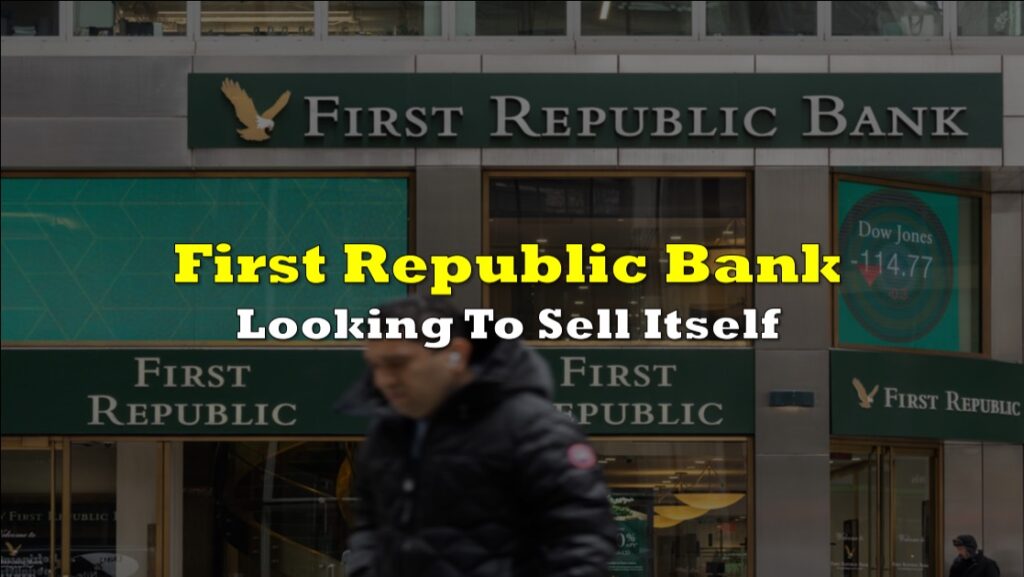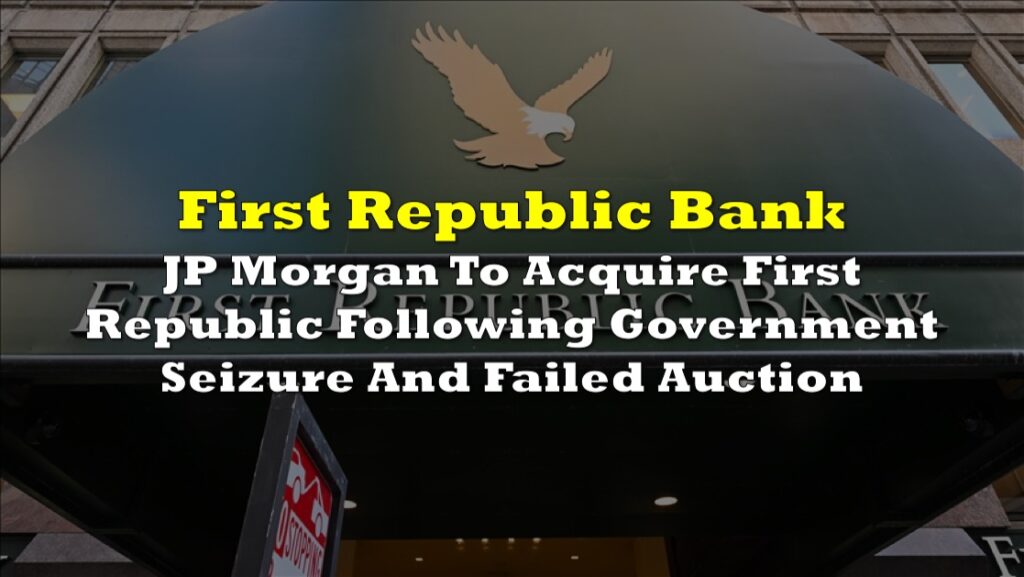First Republic Bank (NYSE: FRC) shares fell more than 20% in pre-market trading after the company announced that deposits fell by more than $100 billion in Q1 2023 and that it was considering options such as restructuring its balance sheet.
The deposit decline overshadowed profits that exceeded forecasts for the struggling institution, which had been bolstered by deposits from U.S. banking titans last month following the failure of two regional lenders.
First Republic Bank $FRC obliterated in after hours trading after reporting earnings pic.twitter.com/wHttoYyla1
— Barchart (@Barchart) April 24, 2023
First Republic, based in San Francisco, wants to reduce its balance sheet and cut expenses in the second quarter by reducing executive salary, reducing office space, and laying off about 20% to 25% of its workforce.
The bank also intends to grow insured deposits while decreasing Federal Reserve Bank borrowings.
“We’re taking steps to meaningfully reduce our expenses to align with our focus on reducing the size of the balance sheet,” CEO Mike Roffler said in a post-earnings conference call that lasted 15 minutes without Q&A.
First Republic also stated that it was “pursue[ing] strategic options” to help accelerate efforts on strengthening the bank, but provided no further specifics.
According to a source who told Reuters, the bank is searching for assistance from the US government by assembling parties who may potentially play a role in boosting First Republic’s fortunes, such as private equity firms and large lenders.
First Republic came into sharp spotlight after the failures of Silicon Valley Bank (SVB) and Signature Bank last month, which shook faith in US regional banks and prompted clients to transfer billions of assets to larger institutions.
“With the closure of several banks in March, we experienced unprecedented deposit outflows,” said Neal Holland, First Republic’s finance chief.
Deposits fell to $104.47 billion in the first quarter from $176.43 billion in the fourth quarter, despite a $30 billion lifeline from U.S. banking heavyweights such as Bank of America Corp., Citigroup Inc., JPMorgan Chase & Co, and Wells Fargo & Co.
Without the $30 billion in deposits given by large banks, the deposit decrease would have been about $102 billion.
Prior to the rescue, First Republic was reportedly already considering strategic options, including a sale. The move is expected to attract attention from larger rivals.
First Republic’s shares also suffered a steep drop back in March after a massive stock sell-off by Alecta, Sweden’s largest pension fund, which liquidated its entire First Republic stake at a staggering loss of 7.5 billion kronor ($728 million).
“The uncertainty about the bank’s future was too great, partly due to the fact that the lender was downgraded to junk status,” explained Alecta CEO Magnus Billing.
In its Q1 2023 financials, the bank’s revenues also fell down to $1.21 billion from Q4 2022’s $1.44 billion and Q1 2022’s $1.40 billion. Net income came down to $269 million, down from last quarter’s $386 million and last year’s $401 million. The bottomline figure translated to $1.23 earnings per diluted share.
While deposits fell, loans shot up to $173.3 billion, up 22.6% from a year ago. Borrowings also dramatically increased to $106.7 billion, from $5.5 billion last year.
$FRC If you strip out the $30B in deposits from large banks, then deposits were down $100B from 12/31/22. That matches the $100B increase in borrowings.
— Lone Elm (@loneelmcapital) April 24, 2023
Lost $100B in cheap deposits, gained $30B in expensive deposits and $100B in expensive debt. They won't make $ for a while. https://t.co/jRuQyYolNY
Financial misstatements
Earlier this year, shareholders sued First Republic and its auditor, KPMG, for alleged misstatements before the recent regional-banking crisis. The bank, its officials, and its auditor have been accused of continuously exaggerating the safety of its business model as interest rates rose, undermining the value of the firm’s loan and securities portfolios.
In its proposed class action, the City of Hollywood, and Florida’s police officers’ retirement system seeks to represent investors who purchased First Republic securities between January 14, 2021, and March 14, 2023. The pension fund cites the bank’s 2020 annual report, which it claims downplayed and hid the dangers of anticipated interest rate rises, changes in its deposit composition, and subsequent deposit outflows.
According to the complaint, the 2020 annual report featured an audit signed by KPMG, which confirmed the bank’s financial figures.
When SVB failed in March, investors “immediately began to question First Republic’s ability to withstand the interest rate environment and remain solvent,” the complaint claims. According to the claim, on the news of SVB, the price of First Republic shares fell by $83.79, or more than 72%, during three trading sessions.
Investors learned more about First Republic’s susceptibility when S&P Global Ratings and Fitch lowered the bank’s ratings, citing changes in its funding and liquidity profile as a “weakest link,” according to the claim.
First Republic last traded at $16.00 on the NYSE, cratering more than 20% in the pre-market trading
Information for this briefing was found via Bloomberg, Reuters, and the sources mentioned. The author has no securities or affiliations related to this organization. Not a recommendation to buy or sell. Always do additional research and consult a professional before purchasing a security. The author holds no licenses.









